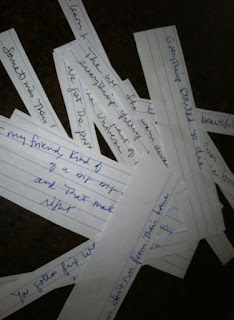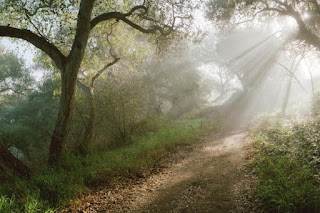In 2004 when I was finishing up my B. A. in English, I submitted a piece of writing to an anthology called
Sacred Waters: Stories of Healing, Cleansing, and Renewal. My personal essay, "Under the Surface" was published in this book in 2005. Here is a copy of the cover; not sure how available this book still is.
Yesterday I revisited my entry in this book because I had referred to it in the poem I wrote, inspired by a reading of "Wild Geese," which I posted yesterday with photos. When I reread the essay, I realized that it kind of ties together my last two blog posts, and seems to be the final piece to wrap up this segment. Together these posts make a story, I guess, which is cool. I love seeing how things from the past and present connect. This is one fine example.
Anyway, I no longer have a hard copy of "Under the Surface" -- obviously lost in some computer crash somewhere. I am retyping it out here, faithful to the original, since I realize many people I know and am in contact today have never read this.
Under the Surface (2004)
On a new moon Saturday in late November, the skies over northeastern Ohio were gray and the air had a chill. I walked the trail through the woods near my home, a winding path through deciduous trees and pine forest.
I strolled along, kicking the leaves, taking in familiar sights and sounds. The trees were bare and the leaves were ankle-deep on the ground, pungent with the woodsy smell of rot as they returned to earth. In the distance, I heard the honking of wild geese as they migrated to a brighter place for the winter. I had only more gray days to look forward to, more cold, and probably plenty of snow.
At the end of the woods sat a lake surrounded by trees and picnic tables. My usual course was to walk right past the lake and straight to my car, drive home, and record in my journal what had transpired on my walk: usually a message from within, a creative thought, or a course of action I might want to take. On this Saturday, despite the cold, I found myself sauntering over to a table alongside the lake.
At age forty-two, I was beginning to feel the effects of midlife. The previous few years had been chaotic and demanding, and I now felt myself at a place where I could choose a new direction.
This was a solitary act if I ever knew one. I was certain I could figure it out, even though I had only a vague idea of what it might look like. I was convinced that what ever it was would come to me in a blinding flash, so I just had to wait for that moment. The wide expanse of lake reflecting the somber skies seemed to match the murkiness I felt about my own direction.
As I sat there, I watched six wild geese floating about randomly. They gathered together in a group and began to create a united voice, swimming from one lake edge to the other.
Listening to their calls, I was reminded of what poet Mary Oliver says about the sound of the wild geese -- "harsh and exciting," announcing their place in the family of things.
I felt a kind of communion with the geese as they toured the lake. Once they reached the opposite edge, they turned around, again in unison, and it appeared they were going to swim back to where they came, like lap swimmers in a pool.
To my surprise, they suddenly took flight, in complete unison, the singing and calling continuing for several minutes afterward, as they flew toward new destinations, to warmer climates that would nourish them in the months to come.
***
I spent nearly an hour by Longwood Lake that day, coming to no conclusions about anything. Once home, I dutifully recorded my encounter with the geese, then promptly forgot about it as I got on with my day. I was a member of a local club and had some phone calls to make to members. One person I called, a friend named David, was home, and we got into a conversation on career matters.
"Helen, you should go back to school and become a teacher. You'd be so good," he said.
I quickly denounced the idea as unworkable. After all, I had no college credits to my name, and with my current financial situation, the thought of attending college was completely outside the bounds of my imagination.
Yet, David's suggestion didn't leave me. For a month, I struggled with it, fought with myself over it, and loudly cursed him in the dark for mentioning it. Something under the surface was rising, something I could no longer deny.
One afternoon, desperate and alone, I found myself in my car, the heater running full blast, windshield wipers beating back wet snow, looking out across a frozen Longwood Lake. Snow lay on the surface and on the picnic table where I sat watching the geese just a few short weeks before.
I honestly don't know what drew me to the lake -- I don't even remember deciding to go there. I shut off the car and made my way through the falling snow to a wooden fishing pier. I climbed the stairs slowly, methodically, marking my way in the snow.
I looked out across the white lake and thought about this thing bouncing around inside me, the long-held dream I never dared to dream: my desire to be a teacher. It was as if a thick layer of ice held it under the surface for more years than I care to recount.
With one swift stroke, David had broken through that ice. I had spent a lot of energy trying to fix the hole he made, instead of looking at what was seeping up to the surface. In a moment of surrender, with swirling snowflakes surrounding me, I softly said, "Yes."
***
I live in Southwest Florida now. No wild geese visit me here. Instead, I am graced with great blue herons, snowy egrets, bald eagles, and common moorhens, all of whom come to the water for nourishment. Nearly seven years have passed since those days by Longwood Lake. Like the geese, I have found a warmer climate, a place that deeply nourishes my spirit. I have also found much more.
As I reflect on that November day in Ohio, I am convinced that mysterious forces were at work, causing a major change in my life. My time by the water created an opening, and along with the right words from a friend and a great deal of inner struggle, I found something that wasn't lost, but was hiding.
I discovered this simple truth: finding one's passion is a sacred act because it happens communally. No blinding revelations are required -- just an open mind and a willingness to listen to that thing that calls to you from the depths.
This year I graduate from college with a bachelor's degree, and I will begin teaching middle school. The lake on which I now live continues to teach me about the family of things, the life we don't expect, the places at which we never thought we'd actually arrive.
Like the wild geese, we may seem to be floating randomly on the water of our lives. But our Calling calls to us, causing us to lift our wings and fly, singing in unison with others, beating our way toward our previously unimaginable dreams, and the pursuit of our fantastic passions.
















